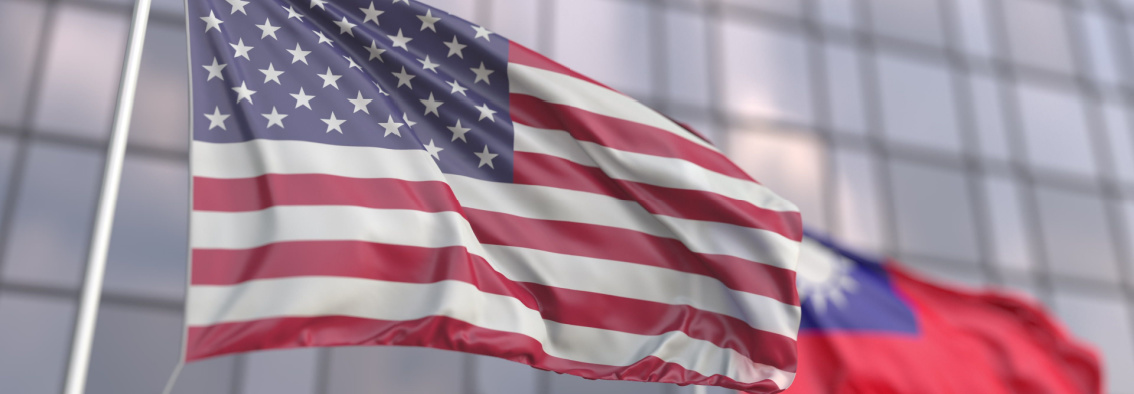Before looking ahead to 2023, let us recall the year just finished—for 2022 was a turning point in US-Taiwan relations. The war in Ukraine concentrated Washington’s mind on the prospect that Taiwan might be next, while “Quad” and NATO capitals upgraded their ties with Taipei, reflecting their own anxieties. In August, Speaker of the House Nancy Pelosi dismissed Biden Administration misgivings and made a morale-boosting visit to Taipei (just as she had to Kyiv three months earlier). And even without Speaker Pelosi’s prodding, the Biden Administration itself grew increasingly forward-thinking about the military, political, economic, and trade relationships between the United States and Taiwan.
Across the Taiwan Strait, China’s 2022 military threat to Taiwan was alleviated somewhat by Chairman Xi Jinping’s (習近平) priority domestic concerns: “Zero-Covid” policies; a precipitous economic downturn; and apparent displays of popular discontent during the Chinese Communist Party’s 20th Congress, during which the chairman launched China into the second decade of his rule. But this period of threat alleviation is over.
President Biden and Chairman Xi also held their first face-to-face summit at the G-20 in Bali in 2022, which was oddly marked by low-key differences on Taiwan and hyperactive urgency on climate change. It was marked as well as by discussion of how best to help the world gain access to Russian gas and oil—and Ukraine’s agriculture—through ports controlled by Russia. The situation surrounding Ukraine can only get worse.
Back in Washington, Republicans were elected to a narrow majority in the US House of Representatives, while Democrats retained knife-edge control of the US Senate. So far, this fragile balance in Congress has brought an overwhelming 365-65 bipartisan vote for seemingly only one thing: a new House select committee on “Strategic Competition between the United States and the Chinese Communist Party.”
US-Taiwan relations in the year 2023 will evolve from these events and more.
Military Relations
It is a certainty that, in 2023, the Ukraine War will descend into the greatest European bloodletting since World War II. Russia’s barbarity and Ukraine’s determination to resist will suck the oxygen from Europe’s debates. It is possible that the carnage may even give second thoughts to Xi Jinping. US-Taiwan military relations will deepen. Intense bipartisan congressional pressure will be levied on the Biden Administration and the Pentagon to avoid the sort of American preemptive declarations of non-involvement that contributed to the Ukraine holocaust in the first place. [1] There will be more appropriations and authorizations for Taiwan-related defense initiatives. The Pentagon will greatly expand its current, relatively modest—and still secret—uniformed military presence in Taiwan beyond small arms and unconventional warfare training.
We can expect significant news from the Pentagon around March 2023, as it delivers several separate mandated briefings to congressional armed services committees regarding the Department of Defense’s planning for Taiwan’s defense. By the end of the year 2023, the Pentagon will also have gone through several iterations of tabletop exercises for Taiwan wartime scenarios, which may well highlight newsworthy deficiencies in defense planning. The 2023 NDAA also demands that the Pentagon give consideration to “economic and financial measures, by the United States, with US allies and partners, to deter and respond to a contingency involving Taiwan.” [2]
The NDAA surprisingly expanded the vision of the 1979 Taiwan Relations Act (TRA) by mandating that the Pentagon not simply maintain the capacity to “resist the use of force” against Taiwan, but to further resist a potential fait accompli that might checkmate US forces interceding in a crisis. Also sure to generate news in 2023 is an incorporated act within the 2023 NDAA entitled the “Taiwan Enhanced Resilience Act” (TERA), which significantly expands the TRA’s defense commitments to include “civilian defenses” and continuity of government—and perhaps most controversially, defenses of the “offshore islands” and other areas. [3]
For 2023, the TERA also envisions “expanding United States economic relations with Taiwan” and cooperation in international aid and development, as well as broad new educational and public health programs.
A new Marine Littoral Regiment (MLR) based on Japanese islands near Taiwan will be entrusted with a Taiwan-oriented mission and, according to the Congressional Research Service, two additional MLRs will be trained and equipped for crisis deployment to the region for “long-range anti-ship” and “littoral anti-air” missions, in order “to accomplish sea denial and control within contested maritime spaces.”
In 2023, the United States and Japan could undertake strenuous efforts to pre-position new combat elements and munitions depots broadly adjacent to the Taiwan theater. These will include new multi-function US Air Force elements to be rotated through Nansei Shoto Island airfields and staging areas on an ad hoc basis, as well as special US Army units now gaining experience with Ukraine. Over the coming year the Japanese Marine Self-Defense Force (JMSDF 海自) will also embark on an up-tempo program for foreseeable Taiwan contingencies.
The Potential for Crisis
Although the Biden Administration has vowed to “ensur[e] competition does not veer into conflict” with China in 2023, Beijing has no such policy. It is likely that China will provoke a crisis—with Taiwan as the backdrop—in 2023. Beijing will seek to distract the Washington-Tokyo alliance through manufactured at-sea encounters, mid-air confrontations, seizures of unmanned platforms, and “gray zone” harassments by Chinese civilian “fishery” craft, maritime militia vessels, and its coast guard. As in April 2001 during the EP-3 crisis, there is always a 50-50 chance that such an incident could result in death. In the event of such incidents, Chinese crisis managers have at the ready economic retaliation and elaborate propaganda methods, to include planned “mass demonstrations.” Whether US or Japanese or Taiwanese leaders can maintain calm and balance will depend on their own crisis preparations. In any event, rather than intimidating them, these crises will only heighten pushback from Tokyo and Washington—and Taipei.
Political Relations
Every year brings its own political baggage. 2023 will not be a big voting year in the United States, but the later months of the year promise intense electioneering in Taiwan ahead of legislative and presidential elections to be held in early 2024.
China will be ever alert for opportunities to complicate Washington’s relations with Taipei. With the foreign affairs and Taiwan portfolios in China now led by cadres with strong intelligence and united front backgrounds—including Politburo member Wang Yi (王毅), Foreign Minister Qin Gang (秦剛), and Taiwan Affairs Office (TAO, 國務院台灣事務辦公室) minister Song Tao (宋濤)—Chinese diplomats and agents of influence will engage in nonstop covert lobbying efforts directed against American officials, opinion elites, news outlets, and social media in order to promote distrust of Taiwan’s leadership.
Already, Beijing’s whisper campaigns dissuade American decision-makers from rejecting pro-China political figures in Taiwan. [4] As in past years, 2023 will see Beijing’s covert propagandists leverage Washington’s hopes that “competition does not veer into conflict, and […] that we can responsibly manage the relationship with China” into distrust and uneasiness with pro-American political figures in Taiwan.
Throughout 2022, the Biden Administration walked a fine line between reciprocating China’s open hostility and caving in to Chinese pressure. The president repeated assurances that the United States will become “militarily involved” to counter a Chinese attack on Taiwan, while his aides added only that US policy had “not changed.” This was successful in confusing Beijing’s leadership. Yet Beijing is taking no chances, and throughout 2023 will probably intensify its armed air and sea incursions around Taiwan.
The new year may also see another visit to Taiwan by a speaker of the US House, this time by Kevin McCarthy. [5] Such a visit could normalize higher-level US visits to Taiwan, and also demonstrate the independence of Congress—in contrast with the Biden Administration, which is more constrained by Chinese pressure.
APEC Forum
In 1991, China, Hong Kong, and Taiwan were admitted simultaneously to the Asia-Pacific Economic Cooperation (APEC) forum on the basis of equality. As The New York Times put it at the time: “At last week’s meeting, in an unusual display of pragmatism over ideology, China, Hong Kong and Taiwan took their seats side by side.” Indeed, the 1989 founding “Principles of APEC” nominally grant “equal respect for the views of all participants,” and insist that “co-operation should be based on non-formal consultative exchanges of views among Asia-Pacific economies.” [6] Yet in 1993, the United States volunteered to host APEC events and organized a first-ever “leaders’ summit” for all APEC heads of government. President Bill Clinton sheepishly disinvited Taiwan’s President Lee Teng-hui (李登輝) when China’s Jiang Zemin (江澤民) refused to attend. [7]
The United States will host the APEC forum again in 2023, and for the third time, will face the thorny task of including Taiwan in various conclaves together with China and Russia. Given several legislative mandates in the NDAA 2023 regarding “Taiwan’s meaningful participation in international organizations,” the Biden Administration will be under pressure to ensure that Taiwan’s participation in the 2023 APEC will be more “meaningful” than in previous APECs. [8] Indeed, it is possible the administration might find it desirable to dissuade Moscow (and perhaps China) from even participating in the 2023 APEC leaders’ summit. Inviting a “meaningful” Taiwan leader to participate—in tandem with a bilateral Biden summit with the invited Taiwan “leader” in the spirit of “APEC Principles”—may provide such dissuasion.
Economic and Trade Relations
The United States and Taiwan have already begun 2023 with significant bilateral trade consultations underway in Taipei between the US Trade Representative (USTR) and Taiwan’s Bureau of Foreign Trade (BOFT, 經濟部國際貿易局). The two sides spent nine months of 2022 laying significant groundwork for the “US-Taiwan Initiative on 21st-Century Trade.” While prospects are excellent for substantive bilateral trade agreements on anticorruption, small and mid-sized enterprises, regulatory practices, and services and trade facilitation, there is also enthusiastic and bipartisan congressional support for deepened US-Taiwan trade relations and Taiwan advanced technology investments in the United States. However, progress on major issues like agricultural and digital trade will come under pressure during Taiwan’s domestic political campaigns, as noted above.
Conclusion
The NDAA 2023’s massive amount of Taiwan-related text, including the 42-page TERA—albeit mostly aspirational, non-binding, and “report-centric”—provides considerably more calendar deadlines and policy direction to US-Taiwan policy than any previous legislation since the TRA in 1979. The new “US-Taiwan Initiative on 21st-Century Trade” also imparts a hefty momentum to bilateral trade prospects for the coming year. Most importantly of all, the prolonged torture in Ukraine will underscore the western alliance’s stake in the survival and success of liberty in Taiwan.
The main point: After a tumultuous 2022, the US-Taiwan relationship is likely to face significant challenges in 2023. Amid substantial pressure from the PRC, the United States and its allies will need to support Taiwan more than ever.
[1] On January 25, 2022, President Biden stated that “We have no intention of putting American forces or NATO forces in Ukraine.” In response, a reporter asked: “Just to be clear, you say—Mr. President, more than economic consequences or geopolitical consequences, could there be military consequences?” The president responded: “There [are] not going to be any American forces moving into Ukraine.” See: The White House, “Remarks by President Biden in Press Gaggle” (press release), January 25, 2022, https://www.whitehouse.gov/briefing-room/speeches-remarks/2022/01/25/remarks-by-president-biden-in-press-gaggle-4/.
[2] Sec. 1088, National Defense Authorization Act for Fiscal Year 2023 [NDAA 2023], H.R. 7776, signed by the President on December 23, 2022. (Hereafter “NDAA 2023.”)
[3] NDAA 2023, Sections 5501 – 5536.
[4] Compare two articles a decade apart: Kathrin Hille, “Taiwan presidential contender sparks US concerns over China tensions,” Financial Times, January 15, 2023 at https://www.ft.com/content/073c1abc-b230-48df-986e-42002b817e6a; with Anna Fifield, Robin Kwong, and Kathrin Hille, “US concerned about Taiwan candidate,” Financial Times, September 15, 2011, at http://www.ft.com/cms/s/0/f926fd14-df93-11e0-845a-00144feabdc0.html.
[5] “Nancy Pelosi’s successor as U.S. Speaker of the House for the 118<sup”>th Congress, Kevin McCarthy, stated in July 2022 that he, too, would like to lead a delegation to Taiwan as Speaker.” See: Susan V. Lawrence, “Taiwan: Political and Security Issues,” Congressional Research Service CRS IN FOCUS, updated January 10, 2023.
[6] Cited in Andrew Elek, “ASIA PACIFIC ECONOMIC CO-OPERATION (APEC),” Southeast Asian Affairs, 1991, pp. 33-48, https://www.jstor.org/stable/27912017.
[7] China announced on July 8, 1993 that it would not attend the 1993 APEC summit in Seattle because Taiwan was not “sovereign state” and had “no right to attend” (FBIS-CHI-93-129); President Clinton, on July 9 in Tokyo, made his first public proposal that APEC host a summit of the 15 APEC member nations. Moreover, “Clinton mentioned Taiwan’s successes in political and economic development three times in his speech yesterday. US presidents have rarely praised Taiwan’s development successes as many times as he did on a single occasion. That President Clinton did that indicates that he is quite familiar with Taiwan’s economic and political development” (FBIS-CHI-93-130). That same day, Taipei’s foreign ministry stated “It is an indisputable fact that the Republic of China [ROC] is a sovereign state” (FBIS-CHI-131). In the end, Beijing was successful in preventing Taiwan’s president from participating at the Seattle meeting, a move that ceded to Beijing a complete veto over which Taiwan personalities would be allowed to join future APEC “leaders’ summits.”
[8] NDAA 2023 Sections 5516-5519.





